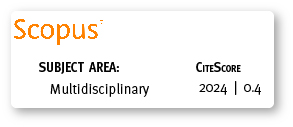Evaluación preliminar de las competencias numéricas de los niños de un preescolar y un jardín de infantes públicos en Cuenca
DOI:
https://doi.org/10.18537/mskn.06.01.04Palabras clave:
matemática inicial, pre-escolar, jardín de infantes, competencias matemáticasResumen
Existe abundante evidencia de que los niños pequeños son capaces de desarrollar un conocimiento matemático y que las destrezas aritméticas de estos niños son predictores de su desempeño académico futuro. También existe un acuerdo común de que la calidad de la educación matemática inicial tiene una importante influencia en el aprendizaje posterior de los niños. En Ecuador hay escasos estudios sobre las competencias matemáticas tempranas de los niños y sobre su enseñanza. Por ello, se inició un estudio para (1) evaluar las competencias numéricas de los niños de pre-escolar y kindergarten (primero de básica) que asisten a una escuela pública de Cuenca, con el objetivo de analizar críticamente su pensamiento y razonamiento numérico; y (2) examinar las prácticas y creencias de los profesores con relación a la enseñanza de la matemática y a las competencias matemáticas de los niños. La aplicación del Test de Conocimiento Numérico (Griffin, 2005) demostró que la mayoría de los niños participantes no habían desarrollado habilidades numéricas básicas. Adicionalmente, los profesores expresaron una fuerte creencia de que los niños pequeños no son capaces de tener un pensamiento matemático. Como consecuencia, las actividades matemáticas que realizan los niños y profesores son desarrolladas de manera insuficiente. Las implicaciones científicas y prácticas de estos resultados son discutidas.
Descargas
Métricas
Citas
Aunio, P., M. Niemivirta, 2010. Predicting children’s mathematical performance in grade one by early numeracy. Learn. Individ. Differ., 20, 427-435.
Barnett, W.S., C.R. Belfield, 2006. Early childhood development and social mobility. Future Child., 16(2), 73-98.
Baroody, A.J., 2001. The developmental bases for early childhood number and operations standards. Invited paper written for the follow-up conference to the Conference on Standards for Preschool and Kindergarten Mathematics Education. Dallas, Texas, USA.
Baroody, A.J., 2004. The developmental bases for early childhood number and operations standards. In: Clements, D.H., J. Sarama, A.-M. DiBiase (Eds.), Engaging young children in mathematics: Standards for early childhood mathematics education, pp. 173-219. Publisher: Mahwah, NJ, Lawrence Erlbaum Associates Inc.
Baroody, A.J., M. Cibulsksis, M. Lai, X. Li, 2004. Comments on the use of learning trajectories in curriculum development and research. Math. Think. Learn., 6, 227-260.
Baroody, A.J., M.-I. Lai, K.S. Mix, 2006. The development of young children’s number and operation sense and its implications for early childhood education. In: Spodek, B., O.N. Saracho (Eds.), Handbook of research on the education of young children (2nd ed.), pp. 187-221.
Bereiter, C., S. Engelman, 1966. Teaching disadvantaged children in the preschool, 312 pp. Englewood Cliffs, NJ: Prentice-Hall.
Clements, D.H., 2004. Major themes and recommendations. In: Clements, D.H., J. Sarama, A.-M. DiBiase (Eds.): Engaging young children in mathematics: Standards for early childhood mathematics education, pp. 7-72. Publisher: Mahwah, NJ, Lawrence Erlbaum Associates Inc.
Clements D.H., J. Sarama, 2007. Early childhood mathematics learning. In: Lester, F.K., Jr. (Ed.), Second handbook of research on mathematics teaching and learning. Charlotte, NC: Information Age, 724 pp.
Clements D.H., J. Sarama, C.B. Wolfe, 2011. Tools for early assessment in math (TEAM). Teacher´s Guide. Mc Graw Hill Education Series.
Copley, J.V., 2004. The early childhood collaborative: A professional development model to communicate and implement the standards. In: Clements, D.H., J. Sarama, A.-M. DiBiase (Eds.), Engaging young children in mathematics: Findings of the 2000 national conference on standards for preschool and kindergarten mathematics education, pp. 83-87. Publisher: Mahwah, NJ, Lawrence Erlbaum Associates Inc.
De Smedt, B., L. Verschaffel, P. Ghesquiere, 2009. The predictive value of numerical magnitude comparison for individual differences in mathematics achievement. J. Exp. Child Psychol., 103, 469-479.
Duncan, G.J., C.J. Dowsett, A. Claessens, K. Magnuson, A.C. Huston, P. Klebanov, C. Japel, 2007. School readiness and later achievement. Dev. Psychol., 43, 1428-1446.
Evans, G.W., J. Rosenbaum, 2008. Self-regulation and the income-achievement gap. Early Child. Res. Q., 23(4), 504-514.
Fuson, K., 2004. Pre-K to grade 2 goals and standards: Achieving 21st century mastery for all. In: Clements, D.H., J. Sarama, A.-M. DiBiase (Eds.), Engaging young children in mathematics: Standards for early childhood mathematics education, pp. 105-148. Mahwah, NJ: Lawrence Erlbaum Associates Inc.
Geary, D., 2011. Cognitive predictors of achievement growth in mathematics: A 5-year longitudinal study. Dev. Psychol., 47, 1539-1552.
Gelman, R., C.R. Gallistel, 1978. The child´s understanding of number. Cambridge, MA: Harvard University Press.
Ginsburg H.P., A.J. Baroody, 2003. Test of early mathematics ability (3rd ed.). Austin, TX: PRO-ED.
Greenes, C., H.P. Ginsburg, R. Balfanz, 2004. Big math for little kids. Early Child. Res. Q., 19, 159-166.
Griffin, S., 2004. Building number sense with number worlds: A mathematics program for young children. Early Child. Res. Q., 19, 173-180.
Griffin, S., 2005. Fostering the development of whole-number sense: Teaching mathematics in the primary grades. In: Donovan, M.S., J.D. Bransford (Eds.) How Students Learn: History, mathematics, and science in the classroom. Committee on How People Learn, A Targeted Report for Teachers. Division of Behavioral and Social Sciences and Education, Washington DC: The National Academies Press.
Griffin, S., R. Case, 1997. Re-thinking the primary school math curriculum: An approach based on cognitive science. Issues Educ., 3, 1-49.
Jordan, N.C., J. Glutting, C. Ramineni, 2010. The importance of number sense to mathematics achievement in first and third grades. Learn. Individ. Differ., 20, 82-88.
Jordan N.C., D. Kaplan, L.N. Olah, M.N. Locuniak, 2006. Number sense growth in kindergarten: A longitudinal investigation of children at risk for mathematics difficulties. Child Dev., 77, 153-175.
Jordan N.C., D. Kaplan, C. Ramineni, M.N. Locuniak, 2009. Early math matters: Kindergarten number competence and later mathematics outcomes. Dev. Psychol., 45, 850-867.
Kilpatrick, J., J. Swafford, B. Findell, 2001. Adding it up. Helping children learn mathematics. Washington DC, National Academy Press.
Krajewski, K., W. Schneider, 2009. Exploring the impact of phonological awareness, visual-spatial working memory, and preschool quantity-number competencies on mathematics achievement in elementary school: Findings from a 3-year longitudinal study. J. Exp. Child Psychol., 103, 516-531.
Ministerio de Educación, 2012. Rendición de cuentas 2011, Quito, Ecuador.
Ministerio de Educación (2013). Archivo maestro de instituciones educativas AMIE. Reporte de registros educativos 2013-2014.
Piaget, J., 1969. The psychology of the child. New York: Basic Books.
Raudenbush, S.W., 2009. The Brown legacy and the O´Connor challenge: Transforming schools in the images of children´s potential. Educ. Res., 38, 169-181.
Sarama, J., D.H. Clements, 2009. Early childhood mathematics education research: Learning trajectories for young children. New York: Routledge.
Sophian, C., 2004. Mathematics for the future: Developing a head start curriculum to support mathematics learning. Early Child. Res. Q., 19, 59-81.
Starkey, P., A. Klein, A. Wakeley, 2004. Enhancing young children’s mathematical knowledge through a pre-kindergarten mathematics intervention. Early Child. Res. Q., 19, 99-120.
UNESCO, 2008. El Laboratorio Latinoamericano de Evaluación de la Calidad de la Educación (LLECE). Los aprendizajes de los estudiantes de América Latina y el Caribe, Santiago, Chile.
Van de Rijt, B.A.M., J.E.H. Van Luit, A.H. Pennings, 1999. The construction of the Utrecht early mathematical competence scales. Educ. Psychol. Meas., 59, 289-309.
Warfield, J., 2001.Teaching kindergarten children to solve word problems. ECEJ, 28, 161-167.
Wright, R.J., 1994. A study of the numerical development of 5-year-olds and 6-year-olds. Educ. Stud. Mathem., 26, 25-44.
Descargas
Publicado
Cómo citar
Número
Sección
Licencia
Copyright © Autors. Creative Commons Attribution 4.0 License para cualquier artículo enviado a partir del 6 de junio de 2017. Para los manuscritos presentados anteriormente, se utilizó la licencia CC BY 3.0.
![]()
Usted es libre de:
 |
Compartir — compartir y redistribuir el material publicado en cualquier medio o formato. |
 |
Adaptar — combinar, transformar y construir sobre el material para cualquier propósito, incluso comercialmente. |
Bajo las siguientes condiciones:
 |
Atribución — Debe otorgar el crédito correspondiente, proporcionar un enlace a la licencia e indicar si se realizaron cambios. Puede hacerlo de cualquier manera razonable, pero de ninguna manera que sugiera que el licenciador lo respalda a usted o a su uso. |
| Sin restricciones adicionales: no puede aplicar términos legales o medidas tecnológicas que restrinjan legalmente a otros a hacer cualquier cosa que permita la licencia. |
Mayor información sobre este acuerdo de autoría y licencia, transferencia de derechos o solicitudes de reproducción, pueden ser consultados en este enlace.









